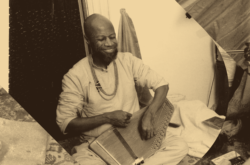LA-based Travis Stewart, a.k.a. Machinedrum, is as multifaceted as producers can be.
You could listen to his entire expansive discography and still not define every part of his musical universe.
Take your ears back to 2001 and experience the junglist and glitchy hip hop grooves of his breakthrough Now You Know. Then, jump ahead to 2011’s Room(s) and let your feet feel his engagement with the uptempo. Next, head to 2013’s Vapor City to witness hazier moments of shoegaze and dream-pop offset by rattling breaks (“Gunshotta,” “Infinite Us,” “More Than Friends”) and the soulful but percussive “Baby It’s U.” Finally, give into 2016’s “Human Energy” for a powerful convergence of dancehall, R&B, pop, future bass, trap, and footwork.
A clear thread connecting Machinedrum’s disparate projects over all of these years is his love for percussive elements, and moreover, an ability to build complex polyrhythms from any instrument or found object. Travis recently went to The Home Depot in search of ordinary objects to create unique percussion sounds with for an exclusive Splice Originals pack. In this article, he shares his experience recording these objects with the Perc Pro and what he hopes his fellow producers will do with them.
To start, tell us about your overall experience recording this pack. Was this your first time recording a sample pack, or was this familiar territory? Did you go into the session with a plan or vision in mind, or did you leave room for improvisation?
It was such a fun experience making this pack. I loved collaborating with Matt Young, a dear friend and talented musician/producer who also works at Splice. We were brainstorming different ideas for making a sample kit. I was telling him about the new Polyend Perc Pro units I had started working with earlier this year and how I have been using them to play random things from my garage as percussion instruments on my tracks. We thought it was a no brainer to go to the source of this kind of percussion, The Home Depot!
We spent about 3 hours walking around the store banging on different objects with multiple materials. We ended up walking out of the store with 2 large carts full of stuff. We could barely fit everything into the car!
This is my first time using mics to record things other than vocals and guitar for a sample pack. Once we had everything set up to record in my studio we just had fun and experimented putting different objects together, kind of like abstract percussion kits.
What kinds of instruments or sounds did you work with? As a musician, how does recording individual samples feel compared to creating an entire composition or song from start to finish?
Our kit consisted of everything from PVC pipes to greek tiles, metal roofing sheets, and La Croix cans. My studio turned into a junkyard of sorts. I remember it being a very loud recording session, especially when using the metal mallet from the Perc Pro against different objects. I bet the neighbors thought we were building a spacecraft.
Recently, I’ve been getting into the habit of making samples for specific projects before I start writing the actual songs – that way I have a palette to work with. So this experience of recording the individual sounds first before writing actual songs with them is part of my current process already.
We know that it can be an insightful yet challenging process to create something for a specific audience – in this case, fellow musicians and producers. What were some of the challenges, if any? For instance, did you ever feel any tension between retaining your sound and creating a pack that anyone could use?
The individual one-shots aren’t necessarily something I would identify as part of my sound by any means. However, the loops we created are definitely more in line with the Machinedrum sound. I didn’t feel challenged really – I ended up having a lot of fun making this pack!
In the same way that I make all of my other sample packs, I’m not concerned with someone being able to make music that’s similar to mine with the samples and loops. It’s really up to the individual who uses the sounds to do something unique with them. As a person who frequently uses sample libraries like Splice, I find it important that I add my own voice when it comes to using samples.
To close, what do you hope producers and musicians will create with your sounds?
I hope this pack gives producers some more interesting organic percussion to add to their arsenal, and not just the same 808 kicks and trap snares we’ve been hearing everywhere!
December 14, 2018



